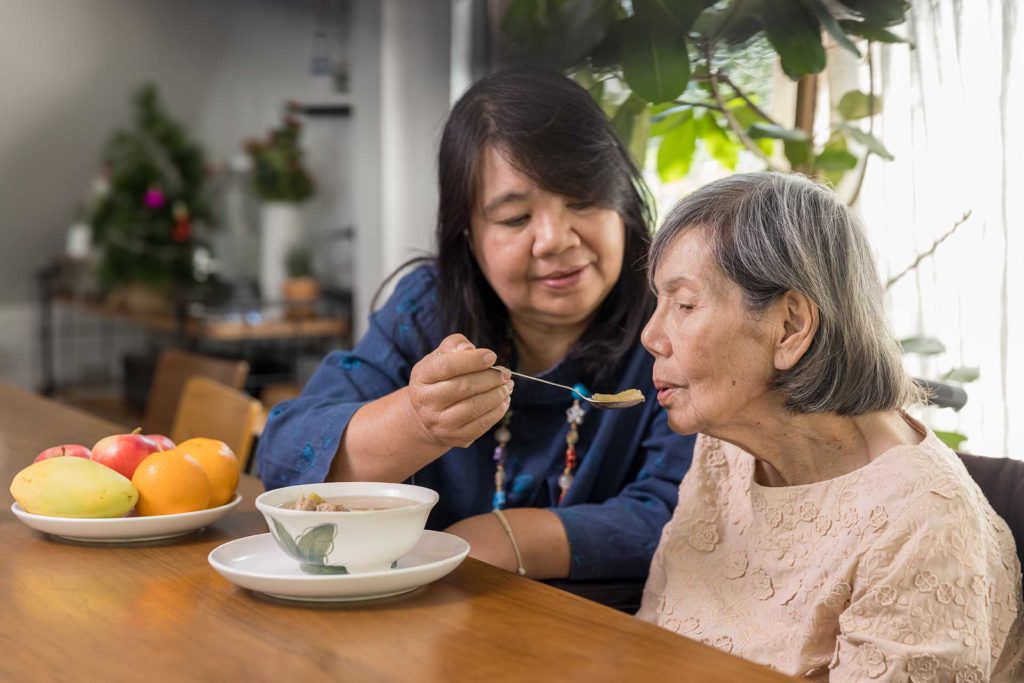Coping with Dementia in 2022: Top Tips for Family Caregivers

Caring for a senior relative is often a demanding role, and being responsible for a loved one with memory care needs can be even more tough. Alzheimer’s disease and other forms of dementia affects each person differently, and you will find your relative’s needs are constantly evolving. With COVID-19 presenting newfound uncertainties in the past 2 years, the key priority for most family caregivers became protecting their loved one from risks posed by the pandemic.
2022 presents a valuable opportunity for you and your senior loved one to reclaim the rich and fulfilling life you both deserve. Family caregivers can benefit from striving to create a balance between meeting the needs of their loved one and preserving their own mental and physical health. Here are just a few of our best tips to help your relative live well, while you thrive in your role as a family caregiver this year.
Understand Their Condition and Learn to Communicate Effectively
Understanding your loved one’s condition could go a long way in helping you to support them, allowing you to step into their shoes and see the world from their perspective more easily. In turn, this deeper understanding can facilitate more effective communication, arming you with the skills to de-escalate stressful situations more effectively.
Individuals who have Alzheimer’s disease or other memory care needs often benefit from simpler types of communication that allow them to express their needs more clearly. If you have noticed your loved one is struggling to communicate their thoughts, feelings and desires, it could be helpful to stick to simple ‘yes’ or ‘no’ questions. When speaking to them, be patient and make sure to give them all the time they need to respond.
Create Routines That Serve Both you and Your Loved one
Routines that complement the needs of both family caregivers and seniors are instrumental in any caregiving relationship. What’s more, for those with memory care needs, routine can be particularly beneficial. If your parent or loved one is struggling with forgetfulness, for example, creating a consistent routine could help them remember to carry out activities of daily living like bathing, dressing and eating.
They may also benefit from using a notebook to keep a written record of upcoming appointments and important events, and a digital calendar or reminder system could help serve as a record for medication management. If your loved one is in the earlier stages of dementia, creating solid routines and reminder systems can be a great way to help them stay independent for longer, while also granting you a little extra peace of mind.
Think About Safety in the Home
Maintaining a loved one’s physical safety is a common struggle for the family caregivers of seniors with memory care needs. Alongside the natural decline in mobility that often comes with aging, Alzheimer’s disease and other forms of dementia can present additional challenges. For example, wandering is a common symptom of Alzheimer’s disease, and increased wandering may elevate the likelihood of a senior running into a tripping hazard.
Things you can do to reduce your loved one’s risk of experiencing a fall or accident include:
- Keeping their home’s decor simple and clean, avoiding patterns that could cause confusion.
- Installing new safety features like strong handrails and safety grips on staircases, or a more accessible bathroom.
- Locking cupboards containing hazardous materials like chemicals, sharp objects or cleaning products.
- Removing tripping hazards like cables, rugs or general clutter.
- If you don’t live with your loved one and have concerns about their safety, you may wish to install security cameras that will allow you to check up on them from time to time when you’re not around.
…and Outside the Home
ven with all the in-home preventative safety measures in the world, accidents can happen outside the home, too. Therefore, it’s important to have provisions in place to protect your loved one should they venture outside the house and become confused or distressed.
You may wish to:
- Get an ID bracelet for your relative to wear, so members of the public know who to call if they find your loved one lost or in distress. You might also like to sew labels into their clothes as a secondary precaution.
- Keep an up-to-date photo of them on hand in case you ever need to report them missing.
Don’t Neglect Your Needs as a Family Caregiver
Caring for a parent or loved one with memory care needs can be challenging. As their condition inevitably progresses, you might find yourself sacrificing more and more of your own time and energy to meet increasingly complex needs. It’s vital that every now and then, family caregivers take a moment to reflect and consider how they are coping and feeling.
It might be the case that you’re managing well, but could benefit from a short additional break each day to take a walk around the block, or by getting an extra hour or two of sleep at night. If your loved one’s needs are becoming less manageable, though, it might be time to look into respite care or 24-hour memory care facilities in San Antonio.
For example, if your loved one is exhibiting aggressive behavior or dealing with sundowning and increased agitation, professional caregivers can offer the specialized care they need. Residential or respite care in San Antonio could also give you the break you deserve, along with precious time to devote to other important areas of your life.
Find out More About Memory Care
If you’re interested in the possibility of professional memory care for your loved one, give us a call or arrange a visit to find out more about the work we do to improve the lives of both seniors and devoted family caregivers.
- Thank You, Family Caregivers - November 22, 2022
- Fall Activities for Seniors with Dementia - October 28, 2022
- 7 Benefits of Memory Care for Seniors and Their Loved ones - September 26, 2022
